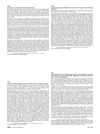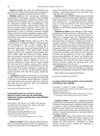 19 citations,
May 2021 in “Clinical epidemiology and global health”
19 citations,
May 2021 in “Clinical epidemiology and global health” Better awareness of chemotherapy's side effects improves self-care.
 14 citations,
September 2020 in “Dermatologic Therapy”
14 citations,
September 2020 in “Dermatologic Therapy” Oral minoxidil improves hair density in women with androgenetic alopecia, with mild side effects.
[object Object]  13 citations,
December 2017 in “Journal of Cosmetic and Laser Therapy”
13 citations,
December 2017 in “Journal of Cosmetic and Laser Therapy” Low-level laser therapy can stimulate hair growth more effectively than fake devices, but patient satisfaction is similar for both. Results should be taken with caution due to small study sizes and differences between studies. More research is needed.
 11 citations,
June 2020 in “Journal of cosmetic dermatology”
11 citations,
June 2020 in “Journal of cosmetic dermatology” Home-use microneedle devices might safely boost 5% minoxidil's effectiveness for hair growth.
 7 citations,
January 2022 in “Evidence-based complementary and alternative medicine”
7 citations,
January 2022 in “Evidence-based complementary and alternative medicine” Ginger supplements helped reduce symptoms and improve metabolic health in hypothyroid patients.
 7 citations,
May 2014 in “Clinical practice”
7 citations,
May 2014 in “Clinical practice” Cooling the scalp may prevent hair loss from chemotherapy, hair often grows back after treatment, and nail issues usually improve after stopping the drug.
 6 citations,
January 2012 in “Journal of Biomedicine and Biotechnology”
6 citations,
January 2012 in “Journal of Biomedicine and Biotechnology” Ustekinumab might work for severe psoriasis, but more research is needed to be sure.
 6 citations,
September 2005 in “Expert Opinion on Pharmacotherapy”
6 citations,
September 2005 in “Expert Opinion on Pharmacotherapy” Androgen therapy can help with symptoms like low libido in women, but more research is needed to understand its long-term safety and effects on health.
 2 citations,
May 2019 in “PubMed”
2 citations,
May 2019 in “PubMed” Oral finasteride and dutasteride may negatively affect erectile function in rats.
 2 citations,
March 2016 in “Obstetrics and Gynecology Clinics of North America”
2 citations,
March 2016 in “Obstetrics and Gynecology Clinics of North America” The document says that common skin conditions in adult women can be treated effectively, with acne being the most common and early-detected melanoma having a high survival rate.
 2 citations,
March 2004 in “Reviews in Gynaecological Practice”
2 citations,
March 2004 in “Reviews in Gynaecological Practice” Hormonal changes and psychological issues can cause sexual dysfunction in postmenopausal women. Behavioral therapy is recommended first, with hormone replacement helping some symptoms but not libido. Testosterone can improve libido, but its effects on overall sexual function are unclear. Emotional and relationship issues should be addressed before using medication, and the benefits and risks of testosterone supplementation should be considered.
 1 citations,
April 2017 in “Journal of Investigative Dermatology”
1 citations,
April 2017 in “Journal of Investigative Dermatology” Tofacitinib may slow hair loss in scarring alopecias but is unlikely to regrow significant hair.
[object Object]  January 2025 in “International Journal of Advanced Research in Science Communication and Technology”
January 2025 in “International Journal of Advanced Research in Science Communication and Technology” Herbal shampoos effectively promote hair growth and control dandruff using traditional herbs and modern technology.
 April 2024 in “Cell death and disease”
April 2024 in “Cell death and disease” Long COVID causes various long-term health issues and needs better awareness and treatment.
 January 2024 in “Journal of neurogastroenterology and motility”
January 2024 in “Journal of neurogastroenterology and motility” Quadruple-coated probiotics significantly improve IBS symptoms.
 December 2023 in “Scientific reports”
December 2023 in “Scientific reports” Fermented soy protein may help prevent bone loss by affecting bone cell activity.
 June 2023 in “Trichology and cosmetology:”
June 2023 in “Trichology and cosmetology:” Ageratum Conyzoides, when taken orally, can effectively reduce hair loss and improve hair growth.
 October 2022 in “Gadua Journal of Pure and Allied Science”
October 2022 in “Gadua Journal of Pure and Allied Science” Terbinafine is the most effective treatment for tinea capitis, a scalp infection often confused with other conditions.

Different scalp and hair disorders are more common in certain ethnic groups, with the most common being androgenetic alopecia, which is treated with medications like minoxidil and finasteride.
 May 2015 in “Journal of The American Academy of Dermatology”
May 2015 in “Journal of The American Academy of Dermatology” A woman with Parry-Romberg syndrome developed new curly hair on one side of her scalp, a condition not previously linked to the syndrome.

Botox is effective for urinary incontinence, chronic migraines, and male pattern hair loss, and a new test for Botox antibodies is more humane.
 March 2020 in “Journal of Laser Applications”
March 2020 in “Journal of Laser Applications” Photobiomodulation therapy significantly increases hair density and growth for androgenic alopecia, but more research is needed to confirm safety.

Hair loss can cause significant social and emotional issues, especially for women and young men.
 2295 citations,
August 2012 in “The international journal of transgenderism/International journal of transgenderism”
2295 citations,
August 2012 in “The international journal of transgenderism/International journal of transgenderism” The guidelines recommend informed consent for gender-affirming treatments and stress the importance of personalized, culturally sensitive care for transgender individuals.
 1265 citations,
October 2013 in “The Journal of Clinical Endocrinology and Metabolism”
1265 citations,
October 2013 in “The Journal of Clinical Endocrinology and Metabolism” The guideline suggests using specific criteria to diagnose PCOS, recommends various treatments for its symptoms, and advises screening for related health issues.
 815 citations,
April 2010 in “The Journal of Clinical Endocrinology & Metabolism”
815 citations,
April 2010 in “The Journal of Clinical Endocrinology & Metabolism” Women with PCOS should be screened for heart disease risk and manage their health to prevent it.
 391 citations,
November 2015 in “Journal of Clinical Lipidology”
391 citations,
November 2015 in “Journal of Clinical Lipidology” The guidelines suggest lifestyle changes, diet adjustments, and personalized medication to manage dyslipidemia and reduce heart disease risk.
 271 citations,
June 2013 in “Human Reproduction”
271 citations,
June 2013 in “Human Reproduction” PCOS is common among Chinese women of reproductive age and linked to serious metabolic and reproductive issues, especially in obese women.
 222 citations,
October 1993 in “Journal of The American Academy of Dermatology”
222 citations,
October 1993 in “Journal of The American Academy of Dermatology” Hair loss affects women's mental health more than men's, causing anxiety, low self-esteem, and social insecurity.
 185 citations,
March 2011 in “The Journal of Sexual Medicine”
185 citations,
March 2011 in “The Journal of Sexual Medicine” Finasteride for hair loss can cause long-lasting sexual side effects like low libido and erectile dysfunction.






























